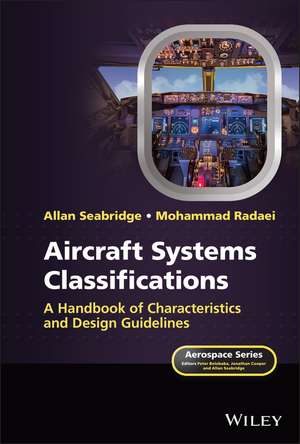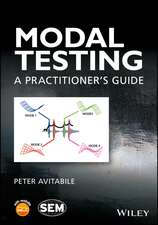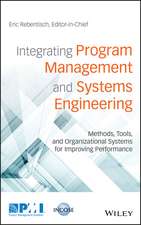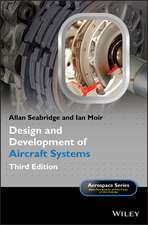Aircraft Systems Classifications: A Handbook of Characteristics and Design Guidelines: Aerospace Series
Autor A Seabridgeen Limba Engleză Hardback – 9 mai 2022
Din seria Aerospace Series
- 5%
 Preț: 512.54 lei
Preț: 512.54 lei - 20%
 Preț: 536.76 lei
Preț: 536.76 lei - 20%
 Preț: 517.08 lei
Preț: 517.08 lei - 24%
 Preț: 724.90 lei
Preț: 724.90 lei - 20%
 Preț: 440.39 lei
Preț: 440.39 lei - 18%
 Preț: 935.27 lei
Preț: 935.27 lei - 24%
 Preț: 652.62 lei
Preț: 652.62 lei - 24%
 Preț: 688.22 lei
Preț: 688.22 lei - 24%
 Preț: 631.09 lei
Preț: 631.09 lei - 24%
 Preț: 545.44 lei
Preț: 545.44 lei - 11%
 Preț: 593.41 lei
Preț: 593.41 lei - 14%
 Preț: 704.57 lei
Preț: 704.57 lei - 24%
 Preț: 522.31 lei
Preț: 522.31 lei - 24%
 Preț: 560.68 lei
Preț: 560.68 lei - 24%
 Preț: 630.67 lei
Preț: 630.67 lei - 20%
 Preț: 443.27 lei
Preț: 443.27 lei - 19%
 Preț: 522.86 lei
Preț: 522.86 lei - 24%
 Preț: 626.71 lei
Preț: 626.71 lei - 20%
 Preț: 402.11 lei
Preț: 402.11 lei - 23%
 Preț: 593.66 lei
Preț: 593.66 lei - 27%
 Preț: 793.65 lei
Preț: 793.65 lei - 9%
 Preț: 734.90 lei
Preț: 734.90 lei - 27%
 Preț: 733.55 lei
Preț: 733.55 lei - 9%
 Preț: 828.21 lei
Preț: 828.21 lei - 9%
 Preț: 893.99 lei
Preț: 893.99 lei - 9%
 Preț: 743.00 lei
Preț: 743.00 lei - 27%
 Preț: 805.21 lei
Preț: 805.21 lei - 27%
 Preț: 915.52 lei
Preț: 915.52 lei - 8%
 Preț: 659.96 lei
Preț: 659.96 lei - 9%
 Preț: 805.96 lei
Preț: 805.96 lei - 8%
 Preț: 670.78 lei
Preț: 670.78 lei - 8%
 Preț: 657.96 lei
Preț: 657.96 lei - 9%
 Preț: 1005.60 lei
Preț: 1005.60 lei - 9%
 Preț: 840.17 lei
Preț: 840.17 lei - 9%
 Preț: 822.75 lei
Preț: 822.75 lei - 8%
 Preț: 700.09 lei
Preț: 700.09 lei - 9%
 Preț: 888.67 lei
Preț: 888.67 lei - 9%
 Preț: 717.39 lei
Preț: 717.39 lei - 9%
 Preț: 1455.39 lei
Preț: 1455.39 lei - 9%
 Preț: 782.69 lei
Preț: 782.69 lei - 27%
 Preț: 1003.10 lei
Preț: 1003.10 lei - 8%
 Preț: 660.21 lei
Preț: 660.21 lei - 8%
 Preț: 612.20 lei
Preț: 612.20 lei - 9%
 Preț: 714.00 lei
Preț: 714.00 lei - 8%
 Preț: 544.16 lei
Preț: 544.16 lei - 9%
 Preț: 789.72 lei
Preț: 789.72 lei - 31%
 Preț: 952.13 lei
Preț: 952.13 lei - 31%
 Preț: 572.59 lei
Preț: 572.59 lei - 31%
 Preț: 586.26 lei
Preț: 586.26 lei
Preț: 873.98 lei
Preț vechi: 960.41 lei
-9% Nou
Puncte Express: 1311
Preț estimativ în valută:
167.26€ • 174.40$ • 139.00£
167.26€ • 174.40$ • 139.00£
Carte tipărită la comandă
Livrare economică 21 martie-04 aprilie
Preluare comenzi: 021 569.72.76
Specificații
ISBN-13: 9781119771845
ISBN-10: 1119771846
Pagini: 384
Dimensiuni: 152 x 229 x 24 mm
Greutate: 0.68 kg
Editura: Wiley
Seria Aerospace Series
Locul publicării:Chichester, United Kingdom
ISBN-10: 1119771846
Pagini: 384
Dimensiuni: 152 x 229 x 24 mm
Greutate: 0.68 kg
Editura: Wiley
Seria Aerospace Series
Locul publicării:Chichester, United Kingdom
Cuprins
About the Authors ix
Acknowledgements xi
Sources of Background Information xiii
Glossary xv
1 Introduction 1
Further Reading 4
2 The Airframe and Systems Overview 5
2.1 Introduction 5
2.2 The Airframe 6
2.3 The Aircraft Systems 10
2.4 Classification of Aircraft Roles 14
2.5 Classification of Systems 25
2.6 Stakeholders 26
2.7 Example Architectures 27
2.8 Data Bus 29
2.9 Summary and Conclusions 34
References 34
Exercises 35
3 Vehicle Systems 37
3.1 Propulsion System 38
3.2 Fuel System 44
3.3 Electrical Power Generation and Distribution 49
3.4 Hydraulic Power Generation and Distribution 53
3.5 Bleed Air System 56
3.6 Secondary Power Systems 59
3.7 Emergency Power Systems 61
3.8 Flight Control System 65
3.9 Landing Gear 68
3.10 Brakes and Anti-skid 71
3.11 Steering System 73
3.12 Environmental Control System 76
3.13 Fire Protection System 79
3.14 Ice Detection 82
3.15 Ice Protection 84
3.16 External Lighting 86
3.17 Probe Heating 89
3.18 Vehicle Management System (VMS) 91
3.19 Crew Escape 93
3.20 Canopy Jettison 97
3.21 Oxygen 99
3.22 Biological and Chemical Protection 102
3.23 Arrestor Hook 104
3.24 Brake Parachute 107
3.25 Anti-spin Parachute 110
3.26 Galley 112
3.27 Passenger Evacuation 115
3.28 In-Flight Entertainment 117
3.29 Toilet and Water Waste 119
3.30 Cabin and Emergency Lighting 122
References 123
Exercise 126
4 Avionic Systems 127
4.1 Displays and Controls 127
4.2 Communications 131
4.3 Navigation 134
4.4 Example Navigation System Architecture 135
4.5 Flight Management System (FMS) 138
4.6 Weather Radar 140
4.7 Air Traffic Control (ATC) Transponder 143
4.8 Traffic Collision and Avoidance System (TCAS) 146
4.9 Terrain Avoidance and Warning System (TAWS) 149
4.10 Distance Measuring Equipment (DME)/TACAN 152
4.11 VHF Omni-Ranging (VOR) 154
4.12 Automatic Flight Control System 156
4.13 Radar Altimeter (Rad Alt) 160
4.14 Automated Landing Aids 163
4.15 Air Data System (ADS) 168
4.16 Accident Data Recording System (ADRS) 172
4.17 Electronic Flight Bag (EFB) 174
4.18 Prognostics and Health Management System (PHM) 178
4.19 Internal Lighting 181
4.20 Integrated Modular Architecture (IMA) 183
4.21 Antennas 185
References 189
5 Mission Systems 191
5.1 Radar System 192
5.2 Electro-optical System 197
5.3 Electronic Support Measures (ESM) 200
5.4 Magnetic Anomaly Detection (MAD) 202
5.5 Acoustic System 205
5.6 Mission Computing System 207
5.7 Defensive Aids 209
5.8 Station Keeping System 212
5.9 Electronic Warfare System 214
5.10 Camera System 217
5.11 Head Up Display (HUD) 220
5.12 Helmet Mounted Systems 222
5.13 Data Link 224
5.14 Weapon System 227
5.15 Mission System Displays and Controls 230
5.16 Mission System Antennas 234
References 237
Further Reading 239
Exercises 239
6 Supporting Ground Systems 241
6.1 Flight Test Data Analysis 243
6.2 Maintenance Management System 246
6.3 Accident Data Recording 248
6.4 Mission Data Management (Mission Support System) 250
6.5 UAV Control 252
References 254
Exercises 255
7 Modelling of Systems Architectures 257
7.1 Introduction 257
7.2 Literature Survey of Methods 259
7.3 Avionics Integration Architecture Methodology 277
7.4 Avionics Integration Modelling of Optimisation 292
7.5 Simulations and Results for a Sample Architecture 297
7.6 Conclusion 300
References 300
8 Summary and Future Developments 305
8.1 Introduction 305
8.2 Systems of Systems 305
8.3 Architectures 314
8.4 Other Considerations 315
8.5 Conclusion 323
8.6 What's Next? 323
Exercise 327
Index 329
















